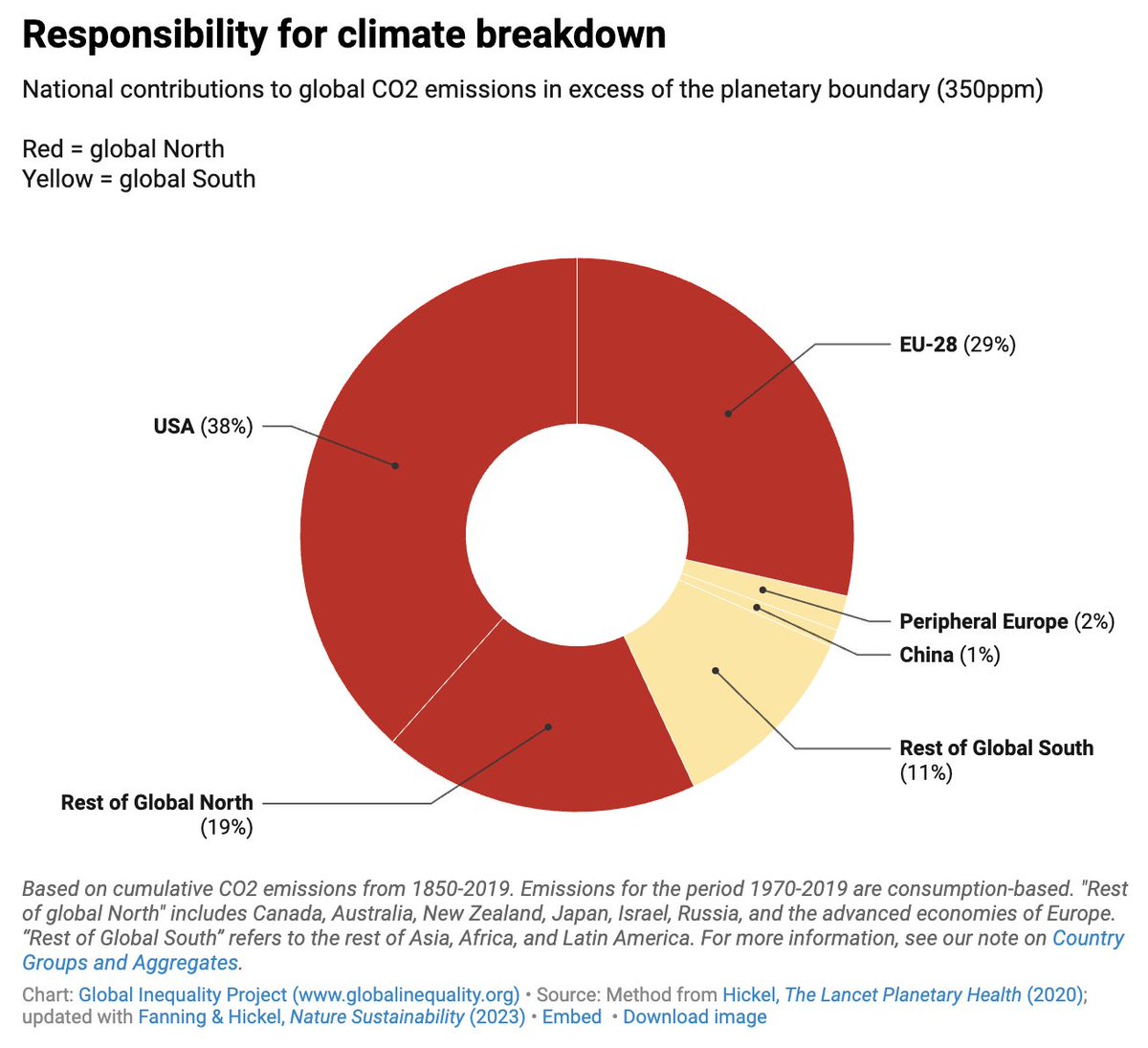I welcome thoughtful critiques of degrowth, and I often learn from them. But this piece by Kelsey Piper is so wildly off the mark that it's hard to know where to start. Here are a few responses, in the thread below. vox.com/future-perfect…
1. Piper says degrowth is "most compelling as a personal ethos, a lens on your consumption habits". In fact degrowth literature explicitly *rejects* this approach in favour of a system-level critique. It's the economic system that's the problem.
2. Piper cites a paper saying that decoupling of GDP from emissions is happening in some rich countries. Yes, of course it is! Renewable energy! The problem is that it is not feasible to decarbonize fast enough for 1.5C if high-income nations continue to pursue growth.
3. We make this argument here, and it has been demonstrated several times in the scientific literature since. I shared this piece with Piper, but she is apparently uninterested in the empirics. tandfonline.com/doi/abs/10.108…
4. Here's the problem: more growth means more energy demand, which makes it harder to decarbonize. Rich nations need to be cutting emissions by 12% per year - they are *nowhere near* that. The solution: scale down energy use so decarbonization can be accomplished faster.
5. Also, we have to keep in mind that emissions are not the only problem we face. Ecological breakdown is being driven also by resource use, which is tightly coupled to growth - and there is no evidence this relationship can be broken even with aggressive efficiency measures.
6. But here is where things get strange. Piper says that degrowth, which focuses on rich countries, would do nothing about the emissions coming from poor countries. Hello - renewable energy transition?
7. Piper seems to assume that degrowth's *only* climate proposal is to scale down production. This is false. We support the Green New Deal, and rapid renewable energy transition; but we argue that this can only succeed if rich nations abandon growthism. sciencedirect.com/science/articl…
8. The road to zero emissions requires a renewable transition. But to accomplish this in the short time we have left, rich nations need to dramatically reduce energy use by scaling down unnecessary production. The policies I lay out in Less is More illustrate how we can do this.
9. Piper claims degrowth in rich nations would harm poor nations. But in fact scholars argue it would liberate the South from extractivism, and allow them to mobilize their labour and resources to meet human needs rather than to service Northern growth. sciencedirect.com/science/articl…
10. Indeed, degrowth scholarship is aligned with anti-colonial movements in the South: sciencedirect.com/science/articl…
11. Piper says reducing excess production (e.g., planned obsolescence) and shortening the working week would cut wages. But we argue for a living wage policy and radical redistribution of income to ensure strong livelihoods for all, with higher welfare purchasing power.
12. Next, Piper says "there’s an extremely strong association between GDP growth and welfare outcomes of every kind." For evidence, she plots child mortality vs GDP per capita, *but uses a logarithmic scale* that creates the impression of a one-to-one relationship: 



13. This is a favorite trick of the folks over at OWID. But it is deeply misleading. Put these charts on a normal linear axis and the reality becomes apparent: it's a saturation curve. 



14. This Preston-Curve pattern has been understood for nearly half a century. Past a certain point, the relationship between GDP and social outcomes breaks down or becomes irrelevant. After that, what matters is distribution and access to public services.
15. This is what explains the fact that Spain, for instance, can so dramatically outperform the USA on social indicators, including a life expectancy that's *five years longer* with less than half of the GDP per capita.
16. Plotting GDP alongside social indicators and calling it a relationship is not science. We need to analyse the actual causal drivers of social outcomes. This yields a very different story indeed: sciencedirect.com/science/articl… 

17. This is not new. For thirty-five years, from Amartya Sen on, scholars have critiqued the notion that GDP has a direct causal relationship with social outcomes. Ignoring this literature is not an acceptable approach.
18. Also, I should mention that Roser's claim here that GDP is just good stuff that people need is Pollyannaish in the extreme. Sure, there's good stuff represented in GDP, but there is also a *tremendous* amount of production that is totally irrelevant to well-being.
19. Overall, in my conversation with Piper it became clear to me that she had not read the literature on degrowth and ecological economics. This is not responsible journalism. We must do better when it comes to representing science.
20. It seems that Piper decided her conclusion before she even started this piece. I understand, degrowth is a challenging idea. But at minimum the argument should be represented fairly and objectively, so that people can make up their own minds.
• • •
Missing some Tweet in this thread? You can try to
force a refresh











